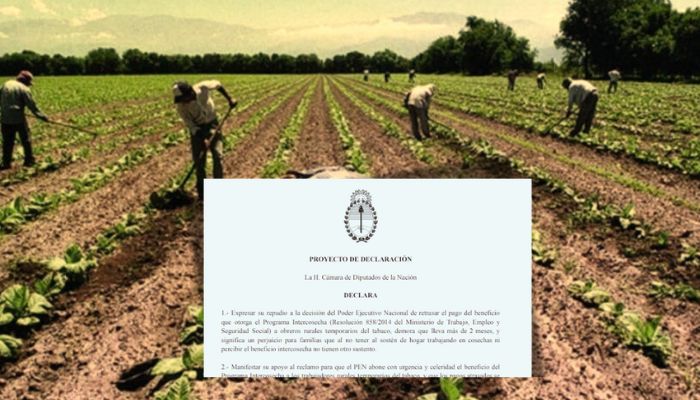
Alejandro Vilca (PTS/FITU) from Jujuy presented a project in the National Congress that repudiates the decision of the Government of Javier Milei to delay the payment of the benefit granted by the Intercosecha Program to the temporary rural tobacco workers in the NOA and NEA regions of the country. With more than 2 months of delay, thousands of families remain without this support, with which they were already juggling in the period of more than 6 months in which there is no harvest.
The project, supported by FITU deputies Nicolás del Caño and Christian Castillo (PTS), Mónica Schlotthauer (IS), Vanina Biasi (PO) and Jorge Antonio Romero, Blanca Osuna and Hilda Aguirre of Unión por la Patria, also proposes that the benefit of the Intercosecha Program should be updated “using as a reference measure the salary of the rural laborer, according to the latest collective bargaining agreement signed by UATRE.”
The National Inter-Harvest Program was created in 2014 to “assist temporary workers in the agricultural and agro-industrial sector throughout the country who are inactive between the harvest of the crop or crops they work with, promoting the improvement of their employability and job placement.” However, thousands of temporary rural workers from provinces such as Jujuy, Salta, Tucumás and the coast have still not received this minimum “benefit” since May: a meager $64,000 a month that they should be receiving during this break from seasonal work. “This delay, in Jujuy alone, affects 4,063 families of tobacco harvesters,” says the PTS/FITU deputy.
“We work only 6 months and the rest of the year we have to do odd jobs to live or emigrate to other provinces and leave our families. Half of us are outsourced and have fewer rights than those hired by the company,” said the rural workers of Jujuy in a short film by La Izquierda Diario. “If we complain, they throw us out and if we get sick, they fire us,” they complain.
The unpaid work of rural workers and their collective efforts, which generate huge annual profits for landowners, tenants, rural and agro-industrial entrepreneurs, have been trampled on for years. “Now Milei’s government is seeking to take away even the minimum right to collect wages during the seasonal period. It is unacceptable,” says Vilca, and highlights that “the national government is making a strict adjustment against workers and popular sectors, and in the case of rural workers this attack is expressed in more than two months without payment of the already minimal inter-harvest benefit, leaving them without a source of work and income. It is an absolute contempt.”
Temporary work, which helps companies increase their profits by intensively exploiting rural and agro-industrial workers for 5 or 6 months a year, and then leaving them to their own devices, contrasts with the huge profits made by agricultural companies. Vilca, who is also the author of a project for a “Law on Inter-harvest and against temporary work in the countryside”, claims in this context that that all the projects presented regarding the need to establish an inter-harvest plan aimed at protecting and strengthening the sector’s workers in their demands be put up for debate.
With a large audience attended by dozens of rural workers, the project proposes to guarantee an inter-harvest plan that provides income and social services during the months when rural workers are out of season, solving this with a “Tax on Large Land and Property Ownership”. In addition, it seeks to attack child labor, promotes the creation of “safety and hygiene commissions” in each workplace and proposes to end temporary work by implementing a productive reconversion that starts with the diversification of crops, incorporating fruits and vegetables from the off-season, and worker control of food production, leaving behind monoculture, which only provides profits to companies and destroys the health and lives of workers with piecework.
FITU in Congress. Five key points of the draft law for rural workers
“While we demand payment for the months owed for the Inter-Harvest Program and that it be at least equal to what was established in collective bargaining, we continue to insist that a comprehensive plan for rural workers be debated and approved in Congress. Our seats are at the service of strengthening the struggle for this perspective, on the path to ending slave labor and job insecurity,” said the FITU deputy.
PD_Payment of Interco Program… by Sol Bajar
Source: www.laizquierdadiario.com

